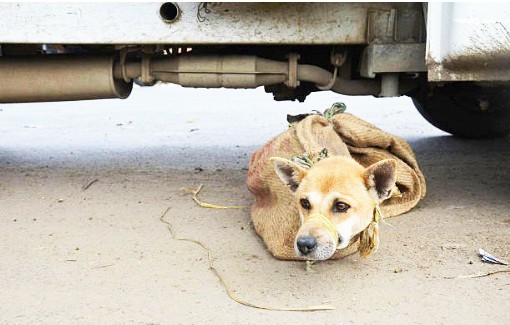File photo of a dog for sale at a market in Dimapur. (Morung File Photo)

Dog-meat ban in Nagaland explodes into raging debate
Morung Express News
Kohima | July 3
The Nagaland Government's July 3 decision proscribing ‘dog-meat’ exploded into raging public debate on the virtual realm. The governmental decree bans the commercial import-trading of dogs and also the sale of both ‘cooked and uncooked’ dog-meat in a state of India often branded for its love affair with a supposedly unconventional dietary list.
While regarded as a welcome move, battle-lines were also drawn, as it received criticism in equal measure, largely on grounds of infringement on people’s dietary practices.
A more humane society
For Dr Watimongla Pongener, Secretary, Society of Prevention of Cruelty to Animals (SPCA) Mokokchung, the decision is a welcome move. “With no offence to those who consume dog meat, I would say let us be a little more humane society. I think we can survive without dog meat. For those who consume and those who oppose consumption of dog meat, both sides will have their arguments but I would say that we can always have alternatives rather than consuming dog meat,” said Dr Pongener.
While it has become a sensitive issue, Pongener also noted that the trade of dogs and sale of dog meat is a painful sight to witness for many. Opining that there are healthier alternatives to dog meat, Dr Pongener expressed the hope that Government agencies such as the Veterinary Department and various groups/societies will be able to build awareness on alternatives to dog meat.
Violation of dietary rights
“First and foremost, it is nonsensical. It will only drive the dog-meat trade underground. It will be another NLTP Act,” viewed journalist Imkong Walling.
With dog meat being culture specific for many Naga tribes, a Naga scholar held the ban as a violation of one's traditional rights.
Walling too asserted that while dog meat as food may be alien to others, to most Nagas “it is just another protein in the existing menu.”
Netizens on social media have voiced similar concerns. One netizen noted, “Cruelty to animals is bad. There has to be ethical norms in place but outsiders policing and coercing the diet of native and indigenous people is problematic.” While banning of commercial imports is acceptable, another netizen viewed that the ban on the sale of dog meat is an exploitation of the indigenous dietary habit.
Young Naga students have also voiced that the ban is ‘a little hypocritical.’
“What about pigs and cows then? Are they not as precious as dogs? Should we ban them too because anyone could domesticate if they would like to?” questioned a college student.
“It somehow defines a part of our culture. I'm pretty sure the people supporting it do not understand our heritage and use this pretense as a form or ‘animal rights’. The shooting of dogs in certain communities is a different issue, but somehow, they are trying to bind this together as well,” viewed another student.
Matter of personal choice
Further, it is also a matter of personal choice. “One cannot regulate the food habits of people. It's equivalent to the beef ban. It is as illogical as asking beef-eaters to stop consuming beef. Just as we held the beef ban as nonsensical, I find this latest regulation also nonsensical,” expressed Walling.
Meanwhile, Walling considered the decision as a “PR move to please the people in Delhi than an actual concern for the safety of dogs”.
“The government might as well rein in the extra-constitutional diktats that have endangered the lives of pets than a PR stunt packaged as a regulation. One must draw a line between dog as food and dog as pet. It's not that all the dogs we rear here are destined to become food,” argued Walling.
Sidestepping priority
Some citizens also took to microblogging site Twitter to weigh in on the ban expressing views that the government’s priority should be on stopping animal cruelty and those who perpetrate animal cruelty, instead of imposing a blanket ban.
“I personally do not eat dog meat but I also do not judge or look down on those who do. Dictating what someone should eat or not is a systematic paralysis. Whether meat should be banned or not shouldn’t have been the concern. How the meat was procured should have been the diagnosis,” a user from Delhi tweeted.
Another said that the ban was ‘confusing.’ “The issue was animal cruelty and not consumption. Regulate the market; we are talking of livelihoods as well as choice of cuisine. As we all know, this will again only lead to formation of a black market for dogs and a syndicate will flourish to meet demands,” the tweet read.
A positive step
Ronald Difoe, an Asst Professor, at Phek Government College stated that the State Cabinet's resolution on the ban is a well directed policy initiative by the government towards treatment of dogs and against cruelty by organized, syndicate groups who are profiting from the trade.
“At the policy level, it is a positive step to legally recognize the issues and challenges that the State faces when it comes to trading of dogs and dog meat at a commercial level. This blanket ban on commercial exploitation of dogs and dog meat will also help citizens to be sensitised on the current issue faced by dogs and will help animal activists to lobby for a law against animal cruelty,” asserted Difoe.






